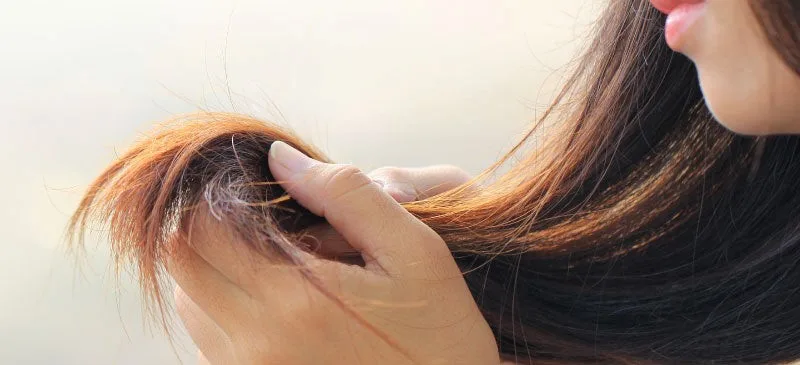It’s important to note that while vitamins play a significant role in maintaining healthy hair, a balanced diet that includes a variety of nutrients, along with proper hair care practices, is essential for optimal results. The role of vitamins in maintaining optimal hair health is paramount, as these essential nutrients play a crucial role in the growth, strength, and overall condition of hair. While a variety of factors contribute to the health of your hair, including environmental conditions and lifestyle choices, vitamins play a role in promoting strong and vibrant hair.

Vitamin A:
Vitamin A is essential for producing sebum, an oily substance that moisturizes the scalp and keeps hair healthy. It also plays a vital role in the growth of cells, including those in the hair follicles. A deficiency in vitamin A can lead to a dry and itchy scalp, potentially resulting in hair thinning or loss. Harvard Health Publishing – Hair Loss. An excessive intake of supplements can lead to toxicity. Therefore, maintaining an optimal balance of vitamin A is crucial for promoting healthy hair.

Natural Sources of Vitamin A:
Vitamin A is essential for maintaining healthy hair, and incorporating natural sources of this nutrient into your diet can contribute to vibrant and strong hair. Here are some natural sources of Vitamin A:
- Sweet Potatoes: These orange-fleshed vegetables are rich in beta-carotene; a precursor to Vitamin A. Beta-carotene is converted into Vitamin A in the body, promoting hair health.
- Carrots: Another excellent source of beta-carotene, carrots provide a nutritious and crunchy option for promoting Vitamin A intake.
- Spinach: Dark, leafy greens like spinach contain not only Vitamin A but also other essential nutrients like iron and folic acid, supporting overall hair health.
- Eggs: Rich in biotin and Vitamin A, eggs are an excellent protein source that promotes healthy hair and scalp.
- Kale: This nutrient-dense leafy green is a powerhouse of vitamins and minerals, including Vitamin A, which aids in maintaining a healthy scalp.
- Pumpkin: Like sweet potatoes, pumpkins are a great source of beta-carotene, which the body converts into Vitamin A to support hair follicles.
- Cantaloupe: This refreshing melon is loaded with Vitamin A and contributes to overall hair health when included in a balanced diet.
- Cod Liver Oil: A potent source of Vitamin A, cod liver oil can be consumed as a supplement or added to your diet in moderation to support hair and scalp health.
- Liver: Organ meats, especially liver, are rich in retinol, the active form of Vitamin A. Incorporating liver into your diet in moderation can provide essential nutrients for hair health.
Vitamin B Complex:
B vitamins, including Biotin (B7), Niacin (B3), and Cobalamin (B12), are crucial for overall hair health. Biotin, in particular, is often associated with hair and strength. https://www.allthingshair.com/en-uk/ .Niacin promotes blood circulation to the scalp, ensuring that hair follicles receive a sufficient supply of nutrients, while Cobalamin helps in the formation of red blood cells, which carry oxygen and nutrients to the scalp and hair follicles.

A variety of these foods in your diet can help ensure an adequate intake of Vitamin B, promoting overall hair health. It’s important to maintain a balanced and nutritious diet for the well-being of your hair and overall health.
Here are some natural sources of Vitamin B that contribute to hair health:
1. Biotin (B7):
Eggs: Biotin is found in the yolk of eggs.
Nuts and seeds: Almonds, peanuts, and sunflower seeds are good sources.
2. Niacin (B3):
Meat: Chicken, turkey, and lean beef contain niacin.
Fish: Tuna and salmon are rich in niacin.
3. Pyridoxine (B6):
Poultry: Chicken and turkey are high in vitamin B6.
Bananas: A fruit source of B6 that also contains other beneficial nutrients.
4. Cobalamin (B12):
Fish: Salmon, trout, and tuna are excellent sources of B12.
Dairy products: Milk, yogurt, and cheese provide B12 for those who consume dairy.
5. Thiamine (B1):
Whole grains: Brown rice, oats, and whole wheat bread contain thiamine.
Legumes: Lentils and black beans are good sources of thiamine

Vitamin C:
Vitamin C is an antioxidant that helps the body absorb iron, a mineral essential for hair growth. It also aids in the production of collagen, a structural protein that provides strength to hair strands. Including vitamin C-rich foods in your diet can contribute to healthier and more resilient hair. Vitamin C is its positive impact on hair health. This essential nutrient is renowned for its antioxidant properties, which contribute to the well-being of hair in several ways.

Here are some descriptions of natural sources of Vitamin C for hair health:
- Citrus Fruits: Citrus fruits like oranges, grapefruits, lemons, and limes are rich in Vitamin C. This water-soluble vitamin helps in the production of collagen, a key component for maintaining hair strength and preventing breakage.
- Strawberries: Strawberries are not only delicious but also packed with Vitamin C. This antioxidant vitamin aids in the absorption of iron, an essential mineral for promoting healthy hair growth.
- Guava: Guava is a tropical fruit that provides a substantial amount of Vitamin C. This nutrient is vital for collagen synthesis, promoting elasticity in hair strands and preventing brittleness.
- Bell Peppers: Bell peppers, particularly the brightly colored ones, are excellent sources of Vitamin C. Incorporating these into your diet can contribute to healthier hair by supporting collagen formation and strengthening hair structure.
- Kiwi: Kiwi is a small but powerful fruit rich in Vitamin C. This vitamin supports the body’s natural production of sebum, an oily substance that helps keep the scalp moisturized and prevents dry, flaky skin.
- Papaya: Papaya is a tropical fruit that not only adds a burst of flavor but also provides a significant dose of Vitamin C. This nutrient helps combat oxidative stress, which can contribute to hair aging and damage.
- Broccoli: Broccoli is a cruciferous vegetable containing Vitamin C, which aids in the absorption of non-heme iron from plant-based foods. Sufficient iron levels are essential for preventing hair loss.
- Pineapple: Pineapple is a refreshing fruit that contributes to your daily Vitamin C intake. This vitamin supports the formation of collagen, maintaining the integrity of hair follicles and preventing breakage.
- Mango: Mangoes are not only a sweet treat but also offer a good supply of Vitamin C. The antioxidant properties of Vitamin C help protect hair follicles from damage caused by free radicals.

Vitamin D:
Vitamin D often referred to as the “sunshine vitamin. Vitamin D is crucial for the generation of new hair follicles, and its deficiency has been linked to hair loss. Exposure to sunlight is a natural way to boost vitamin D levels, but it can also be obtained through dietary sources and supplements. A healthy scalp is essential for promoting optimal hair growth. It’s true that sunlight is a primary source of vitamin D for the body; there are also natural dietary sources that can contribute to overall vitamin D intake and support hair health.

Here are some sources of Vitamin D for hair:
- Fatty fish such as salmon, mackerel, and sardines are excellent sources. These fish not only provide omega-3 fatty acids, which are beneficial for hair health, but also contain significant amounts of vitamin D.
- Eggs are another natural source of vitamin D. The yolk, in particular, contains this essential vitamin, making eggs a convenient and versatile option for those looking to boost their vitamin D intake. Including eggs in your diet can be a simple and effective way to support hair health.
- Mushrooms, especially those exposed to sunlight during growth, are another natural source of vitamin D. Just like humans, mushrooms have the ability to produce vitamin D when exposed to sunlight or ultraviolet (UV) light.
Folic Acid (Vitamin B9):

Here are some natural sources of folic acid that can contribute to healthy hair:
- Leafy Greens: Leafy green vegetables such as spinach, kale, and broccoli are rich in folic acid. Incorporating these nutrient-dense greens into your diet provides not only folic acid but also a range of other vitamins and minerals beneficial for hair health.
- Legumes: Beans, lentils, and chickpeas are excellent plant-based sources of folic acid. These legumes provide a combination of protein and iron, promoting healthy hair growth.
- Asparagus: Asparagus is a vegetable that not only adds a tasty touch to meals but also provides a good amount of folic acid. It’s a low-calorie option with various other health benefits.
- Brussels sprouts: Brussels sprouts are cruciferous vegetables rich in folic acid. They also contain antioxidants that support overall health, including the health of your hair.


